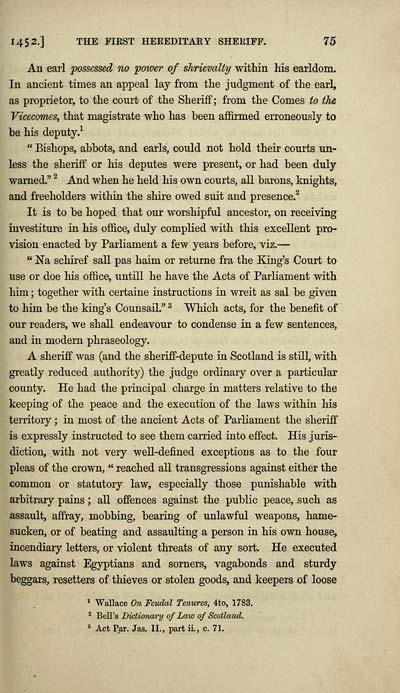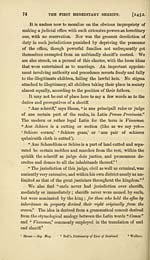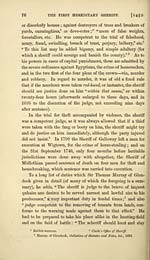Agnews of Lochnaw
(107) Page 75
Download files
Complete book:
Individual page:
Thumbnail gallery: Grid view | List view

145 2 ] THE FIRST HEREDITARY SHERIFF. 75
An earl possessed no poiver of shrievalty within his earldom.
In ancient times an appeal lay from the judgment of the earl,
as proprietor, to the court of the Sheriff; from the Comes to the
Vicecomes, that magistrate who has been affirmed erroneously to
be his deputy. 1
" Bishops, abbots, and earls, could not hold their courts un-
less the sheriff or his deputes were present, or had been duly
warned." 2 And when he held his own courts, all barons, knights,
and freeholders within the shire owed suit and presence. 2
It is to be hoped that our worshipful ancestor, on receiving
investiture in his office, duly complied with this excellent pro-
vision enacted by Parliament a few years before, viz. —
" Na schiref sail pas haim or returne fra the King's Court to
use or doe his office, untill he have the Acts of Parliament with
him ; together with certaine instructions in wreit as sal be given
to him be the king's Counsail." 3 Which acts, for the benefit of
our readers, we shall endeavour to condense in a few sentences,
and in modern phraseology.
A sheriff was (and the sheriff-depute in Scotland is still, with
greatly reduced authority) the judge ordinary over a particular
county. He had the principal charge in matters relative to the
keeping of the peace and the execution of the laws within his
territory ; in most of the ancient Acts of Parliament the sheriff
is expressly instructed to see them carried into effect. His juris-
diction, with not very well-defined exceptions as to the four
pleas of the crown, " reached all transgressions against either the
common or statutory law, especially those punishable with
arbitrary pains ; all offences against the public peace, such as
assault, affray, mobbing, bearing of unlawful weapons, hame-
sucken, or of beating and assaulting a person in his own house,
incendiary letters, or violent threats of any sort. He executed
laws against Egyptians and sorners, vagabonds and sturdy
beggars, resetters of thieves or stolen goods, and keepers of loose
1 Wallace On Feudal Tenures, 4to, 1783.
2 Bell's Dictionary of Law of Scotland.
3 Act Par. Jas. II., part ii., c. 71.
An earl possessed no poiver of shrievalty within his earldom.
In ancient times an appeal lay from the judgment of the earl,
as proprietor, to the court of the Sheriff; from the Comes to the
Vicecomes, that magistrate who has been affirmed erroneously to
be his deputy. 1
" Bishops, abbots, and earls, could not hold their courts un-
less the sheriff or his deputes were present, or had been duly
warned." 2 And when he held his own courts, all barons, knights,
and freeholders within the shire owed suit and presence. 2
It is to be hoped that our worshipful ancestor, on receiving
investiture in his office, duly complied with this excellent pro-
vision enacted by Parliament a few years before, viz. —
" Na schiref sail pas haim or returne fra the King's Court to
use or doe his office, untill he have the Acts of Parliament with
him ; together with certaine instructions in wreit as sal be given
to him be the king's Counsail." 3 Which acts, for the benefit of
our readers, we shall endeavour to condense in a few sentences,
and in modern phraseology.
A sheriff was (and the sheriff-depute in Scotland is still, with
greatly reduced authority) the judge ordinary over a particular
county. He had the principal charge in matters relative to the
keeping of the peace and the execution of the laws within his
territory ; in most of the ancient Acts of Parliament the sheriff
is expressly instructed to see them carried into effect. His juris-
diction, with not very well-defined exceptions as to the four
pleas of the crown, " reached all transgressions against either the
common or statutory law, especially those punishable with
arbitrary pains ; all offences against the public peace, such as
assault, affray, mobbing, bearing of unlawful weapons, hame-
sucken, or of beating and assaulting a person in his own house,
incendiary letters, or violent threats of any sort. He executed
laws against Egyptians and sorners, vagabonds and sturdy
beggars, resetters of thieves or stolen goods, and keepers of loose
1 Wallace On Feudal Tenures, 4to, 1783.
2 Bell's Dictionary of Law of Scotland.
3 Act Par. Jas. II., part ii., c. 71.
Set display mode to:
![]() Universal Viewer |
Universal Viewer | ![]() Mirador |
Large image | Transcription
Mirador |
Large image | Transcription
Images and transcriptions on this page, including medium image downloads, may be used under the Creative Commons Attribution 4.0 International Licence unless otherwise stated. ![]()
| Histories of Scottish families > Agnews of Lochnaw > (107) Page 75 |
|---|
| Permanent URL | https://digital.nls.uk/94899398 |
|---|
| Description | A selection of almost 400 printed items relating to the history of Scottish families, mostly dating from the 19th and early 20th centuries. Includes memoirs, genealogies and clan histories, with a few produced by emigrant families. The earliest family history goes back to AD 916. |
|---|

